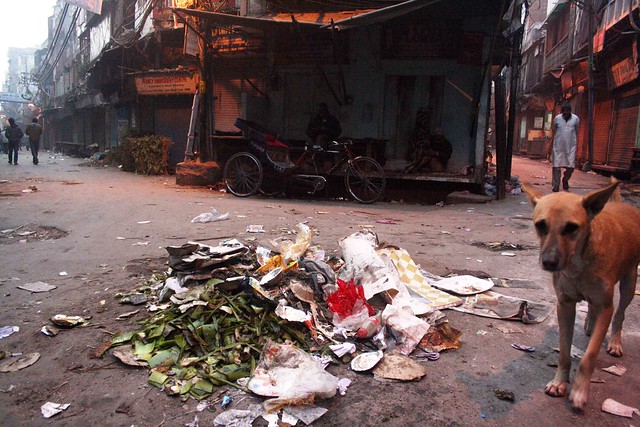
Book Review – Secrets, by Ruskin Bond

Seen better days.
[Text and photos by Mayank Austen Soofi]
The language of author Ruskin Bond, who spent his early childhood in a bungalow in central Delhi’s Atul Grover Marg, is not the kind of English we connect with ad jingles and call centres, or with magic realism and stream of consciousness.
It is the English of a charming old uncle sitting in Lodhi Garden and telling the gardener’s children about his sad, carefree and mischievous early life.
Published in late 2011, Mr Bond’s collection of seven short stories, Secrets, is one of his more superior productions. Set in Dehradun, a town 250km north of Delhi, the stories are derived from his own childhood experiences.
They recall the Anglo-Indians and the “country-born British” stationmasters, civil servants, irritable spinsters and widows with grandchildren. Theirs was a civilization that had mutton kofta for lunch and Irish stew for dinner. A colony of tea and small talk; people dropped in at each other’s bungalows for badminton parties. The drawing room gramophones played Deanna Durbin, George Formby and Gracie Fields.
Set in the mid-1940s, Mr Bond’s stories give a vivid sense of those times. Dehradun had more than 300 horse-driven tongas. There was no superfast Shatabdi Express train to connect it to Delhi. The town had no local newspaper, and news of crime was spread by word of mouth. The local magician ended each show by once again sawing his daughter in half. There were six cinema halls; three showed English films.
Those who had short-wave sets tuned the frequencies to Radio Hilversum, Radio Ceylon, Radio Vienna and the Overseas service of the BBC. Mr Bond’s narrator religiously listened to Much-Binding-in-the-Marsh, a comedy show. Anglo-Indian children of his age were obsessed with the “4Cs: the cinema, comics, chaat and Crime Club thrillers”. They went to boarding schools in the hills and spent vacations with their families in the railway colonies of the plains. Here they played with the children of Indian shopkeepers and clerks who, as the narrator points out, “when they grew up, would be the backbone of the prosperous middle class”.
Mr Bond keeps to a class that was becoming less prosperous with every passing year. In Gracie, about a club singer who migrates to London and becomes a pavement prostitute, the narrator hints at Dehradun’s shifting world: “Sometimes I accompanied Bhim or Ranbir to a Hindi movie, but most of the time I haunted the English cinemas which were still running, although to smaller audiences.”
In Over the Wall, the narrator is spending a holiday with “Granny”: “She hadn’t changed much, but the world was changing fast, and India was now an independent nation. Most of the British, Anglo-Indian and European residents of Dehra had left and gone ‘home’ to England or some other country. Granny wasn’t going anywhere — not unless her home and garden was taken from her.”
The story has another Anglo-Indian character who never returns “home”. Just across Granny’s house is the bungalow of Mr Johnson, a retired civil servant. His younger brother lives in seclusion in an attached cottage; his body is disfigured with leprosy. Twice a day the servant goes in with a “thermos or a tiffin-carrier, and sometimes fruit in a small basket.” After India is free, Mr Johnson sells the house to a certain Major Yadav and leaves town. His brother joins the Indian beggars in the town’s “leper colony”.
A few stories are set during the last years of World War II. Dehradun was designated a “recreational centre” for Allied troops. In the evening, American GIs walked down the tony Rajpur Road singing Sweet Rosie O’Grady. Occasionally there were drunken brawls with the British troops, who would get homesick in the nightclub each time the crooner sang The White Cliffs of Dover. The Italian prisoners of war, who were allowed to walk through Rajpur Road only once a week, were the best behaved. After the war ended, all the soldiers returned home. “A few war-brides went with them. A few illegitimate children were left behind.”
At Green’s Hotel is the collection’s most important story. Not for its serial killer who strangles wealthy women and leaves behind a note saying, “Die in a ditch, you rich bitch”, but because it offers a perfect metaphor for the collapsing Anglo-Indian society. The hotel is a “bungalow-type single-storey building, standing in fairly extensive grounds, with a neglected garden and a tennis court overrun by dandelions, thistles, and marigolds gone wild”. A way of life has been taken over by contemporary events and is being packed into history.
In the same story the narrator advises, “If you want to study human nature, stay in a small hotel that had seen better days”. That could be Mr Bond talking about a world he was born into and which he has so effortlessly conjured up in this book.
Mr Bond’s world has vanished and it is tough to find a similar hotel in today’s Dehradun. But don’t lose heart if you too, like our author, wants to study human nature. Settle in Delhi and rent a shabby room in Shahjahanbad and – it’s my promise – you will find enough material to write short stories for the rest of your life.
Shahjahanabad – Seen better days
Secrets, by Ruskin Bond



THANKS BHAI…seems like another world…
A hilly town (for me having come from the plains of Haryana)
An Anglo-western culture (I only had one Anglo-Indian gf..so do hv some exposer)
An old man, relic from another era (cant relate but intriguing)
Tales of world war II GIs deep in India, far away from the frontlines…
All must be an interesting read… thanks for sharing the review and kindling the hunger to read… you have served your purpose well… Well done again MAS … you rock … Burrahhhhhhh